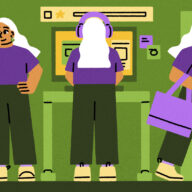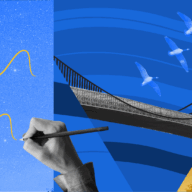The offsite is a staple – for individual teams, departments, or even entire companies. A chance for everyone to get OOO, bond, and get some deep work done. But today, as more and more teams are moving to hybrid or remote working, are offsites necessary? Find out if your distributed team really needs to meet IRL.
Join host Christine Dela Rosa and debaters Marshall Walker Lee and Shannon Winter and find out if your dispersed team really needs to meet IRL. In this episode, you’ll hear from team builder Anne Thornley-Brown on why setting goals for offsites is crucial, and Unsplash’s CEO Mikael Cho shares the story of building his two companies at in-person offsites. ConvertKit’s Charli Prangley defends the trust that can only be built at in-person offsites; while Trello’s Leah Ryder takes us into the wonderful world of virtual retreats.
Episode Takeaways
Transcript
Christine Dela Rosa:
Picture this: you fly into a city you’ve never visited before. You’re taken to a hotel and brought to a boardroom filled with whiteboards, snacks, and a bunch of people. You look around and you find you’re surrounded by familiar faces, but you’ve never met these people before…Wait a second, these are your colleagues…and that’s your boss! But they’re not in tiny boxes on your computer screen. They’re here, in real life! Is this a dream? No – this is an offsite.
Christine Dela Rosa:
Welcome to Work Check, an original podcast from Atlassian, makers of teamwork software like Jira, Confluence and Trello. I’m your host Christine Dela Rosa. On this show, we take workplace practices and separate the hype from the helpful. In each episode, two Atlassians debate how the practice should be applied. In today’s episode, we tackle the offsite. The central question for our debate: are in-person offsites essential for distributed teams? Let’s meet this week’s debaters. We have Marshall Walker Lee strongly in favor.
Marshall Walker Lee:
Who’s ready for a trust fall?
Christine Dela Rosa:
And Shannon Winter, arguing against.
Shannon Winter:
If I can’t do it in my PJs, I’m out.
Marshall Walker Lee:
You can trust fall in your PJs. There’s no dress code for trust falls.
Christine Dela Rosa:
But before we get into the debate, let’s do a little offsite 101. Offsites, sometimes called company retreats, are events where your team gathers away from your usual work environments to focus as a team. They can range from one day to one week, and they can look radically different from one company to the next. Some offsites might gather the team in a hotel ballroom for a catered lunch and some breakouts…while others are more adventurous, like getting the team working together, deep in the wilderness on an outdoor adventure.
Christine Dela Rosa:
But while the practicalities vary, they usually have some goals in common; they get the whole team together for deep work outside of their usual routine; attendees think big picture about the direction of their company; and perhaps most importantly: team bonding.
Now, debaters – the rules: you each get three rounds to make your case for or against. Now, I want a good clean debate, no low blows and keep it snappy. Shannon, Marshall, tell me: are in-person offsites essential for distributed teams? Round one. Shannon, you start us off.
Shannon Winter:
Thanks. Excited to kick this one off! I’m going to start with a point that’s pretty hard to argue with… in-person offsites are expensive.
Christine Dela Rosa:
Can be.
Marshall Walker Lee:
I’m tempted to argue with it, but I’ll let that one slide.
Shannon Winter:
Now, expensive isn’t always a bad thing. But for so many companies, the offsite is really just a legacy practice, a big line item on the budget year after year without stopping to question the benefits. But don’t just take it from me. I want you to meet Anne Thornley-Brown. She’s a team building facilitator who helps companies all over the world plan their offsites, and she says that a lot of company offsites are a real waste of money.
Anne Thornley-Brown:
Many times, companies don’t set goals. I have so many companies call me and when I say, “What are your goals and objectives?” it’s like, “I don’t know.” They haven’t even thought about it. In other words, this is something they do quarterly or annually as a ritual, I suppose, without really thinking about why do we need to do this.
Christine Dela Rosa:
I cannot believe there are offsites that don’t have goals.
Shannon Winter:
Scary, right?
Christine Dela Rosa:
Yep.
Shannon Winter:
It’s a lot of money. Hard on the bank account… and… if you’ll let me expand on this idea – a tax on the environment.
Marshall Walker Lee:
Okay, you’re going there. Huh?
Shannon Winter:
But think about it. So many companies want to be more sustainable, many even aiming to be carbon neutral or carbon zero.
Christine Dela Rosa:
Yeah.
Shannon Winter:
But flying in team members from all over the globe doesn’t help that cause. As I said, they’re a legacy practice. So are pricey, polluting trips that don’t move business goals forward really what we want our legacy to be?
Christine Dela Rosa:
Great question that companies should all be wrestling with. Marshall, you’re up.
Marshall Walker Lee:
All right. Pricey, polluting trips that don’t move business goals forward. There’s a lot to dig into here. So let’s start with that environmental point. I absolutely agree that companies should be concerned about the environment and committed to stewardship. But I’m not so sure that flying a couple of people to an offsite is where most companies can make that marginal difference in their environmental impact. If companies are looking to go carbon-neutral or make other commitments, I think they have more meaningful tools at their disposal.
Shannon Winter:
That’s fair.
Marshall Walker Lee:
But to get to the meat of your argument, that offsites are a waste of money, you have to admit you’re describing pretty poorly-planned offsites. And I totally agree with you, terrible offsites are terrible and they are a waste of money.
Shannon Winter:
Agreed.
Marshall Walker Lee:
But I’m not here to defend terrible offsites. I’m just here to defend the possibility of really great offsites. And I think that when people actually set goals and plan appropriately, then in-person offsites can facilitate the kind of deep, collaborative work that’s so hard to pull off in a remote environment. And that deep work can pay dividends. Meet Mikael Cho, the CEO of Unsplash, one of the world’s leading stock photography companies.
Mikael Cho:
And I think these retreats, they give you that bit of focus, almost like a forced deadline on yourself. No one’s on Slack. We’re barely checking email. There’s just a lot of depth and focus on one or two things.
Marshall Walker Lee:
Now, Mikael is a big fan of offsites and for a good reason. The two companies that he started, Unsplash and Crew before it, were both born at in-person retreats. And he sold those two companies to Getty and Dribble, respectively. Not too shabby.
Christine Dela Rosa:
Whoa.
Marshall Walker Lee:
Yeah. So Shannon, these outings can be expensive. You’re right about that. But a well-planned offsite that results in a multimillion dollar business idea? I think that’s a great investment.
Mikael Cho:
Pound for pound, like if you took this money and said, “You could spend this on anything to accomplish those same objectives as the retreat, would you still spend it on the retreat?” And yes, we would 100% keep doing these retreats.
Marshall Walker Lee:
There you have it. Offsites are big bets, but when you have diligent planners and thoughtful leadership, big bets can pay off. When we meet face to face and we carve out larger blocks of time to connect and brainstorm as a team, we create the conditions that allow big, ambitious ideas to emerge. That’s the beauty of an offsite. So Shannon, Christine, just imagine what the three of us could accomplish if we spent a few days on retreat. Maui? Maui?
Christine Dela Rosa:
You’ve got my planner brain going already.
Shannon Winter:
Whoa. Whoa. Whoa. Let’s hold off on any offsite plans until the debate’s over.
Christine Dela Rosa:
Right. So, this round boils down to: are in-person retreats worth their big spend? I agree they can be expensive. But the cost, time and resources put into offsites adds gravity, where the investment makes the team, you know, invest. As for the winner: plot twist – this round goes to no one!
Marshall Walker Lee:
What? Can we get an external audit?
Christine Dela Rosa:
Listen, I’m calling that a wash because both of your arguments made sense. In-person offsites can be worth the investment for some companies, but if you’re not setting goals, proper goals, that’s definitely a waste of time. So…tie. Okay. To start off round two, Marshall, you have the floor.
Marshall Walker Lee:
All right. Well, that tie really got my competitive juices flowing. So round two. All right. Here we go. Christine, if you don’t mind, I’m going to get personal for just a moment.
Christine Dela Rosa:
Love it.
Shannon Winter:
Uh-oh.
Marshall Walker Lee:
Now let’s say hypothetically, you need someone online.
Christine Dela Rosa:
Sounds real.
Marshall Walker Lee:
Okay. You text, you email, you Zoom.
Christine Dela Rosa:
Uh-huh. Go on.
Marshall Walker Lee:
And the two of you are in contact pretty much every day. You’re sharing information, you’re making plans …
Christine Dela Rosa:
Okay. Sounds less real, but keep going.
Marshall Walker Lee:
… But you never meet in person. Now, would you feel like you really knew this individual? Would you be able to fully trust them? Would you feel like you had a real relationship?
Christine Dela Rosa:
Well…
Marshall Walker Lee:
In the COVID era, this is the reality for millions of workers, myself included. I have never met my team at Atlassian. And even though I think they’re brilliant and thoughtful and fun, something’s missing in the relationship. So let’s set aside the business outcomes for a couple of minutes and get down to the squishy stuff. It’s time to talk about bonding.
Christine Dela Rosa:
Great.
Marshall Walker Lee:
There’s a growing body of research that shows that Zoom and other communications platforms actually negatively impact trust and attachment, and our ability to clearly communicate. And for distributed teams, that’s really bad news. Just remember, it’s literally impossible to make eye contact on Zoom. When I look at you, I’m not looking at the camera, which is where your eye – it’s complicated, right? And to get into all of this a little more deeply, I want to introduce Charli Marie Prangley. She’s a creative director at ConvertKit. Now, they’re a company that makes email marketing software for creators and her company is fully remote.
Charli Marie Prangley:
I think remote work, to be successful, you really need to have trust in your teammates. And it’s really hard to build trust in a completely virtual, digital setting.
Marshall Walker Lee:
Charli’s team does two offsites every year. They spend four full days brainstorming, strategizing, problem-solving, whatever. But most importantly, they’re building their relationships.
Charli Marie Prangley:
I would say the thing I look forward to most is just spending time with the people that I spend a lot of digital time with on a day-to-day basis. And so I walk away from retreats with that sense of connection and that sense of trust renewed, which makes it easier to deal with difficult situations that come up at work. Right?
Marshall Walker Lee:
My point here really is that there is no substitute for that trust and connection that you can only build in person. You need that context to make the remote and hybrid approach work well for most teams.
Christine Dela Rosa:
Fully agree, Marshall. Quick story. When I was in my first job, I worked with a colleague remotely who sent these really gruff emails. And I was convinced he hated me. But when we finally had an offsite together, I realized that’s just how he talked. So yeah, having a sense of someone’s personality and feeling connected to them can be hard to generate without the body language that comes with seeing each other in person. Shannon, do you have a rebuttal?
Shannon Winter:
I actually totally agree that having good relationships and good rapport with your team is crucial.
Marshall Walker Lee:
Okay. And?
Shannon Winter:
And I’m all for team building. But for me, trust is built over time, not just by being in proximity to people over a couple of days. Most of what gets called team building doesn’t actually build teams in an authentic way. Plus, mandatory fun is not fun.
Christine Dela Rosa:
Hear, hear.
Shannon Winter:
I want to bring back my guest Anne, who you met earlier.
Anne Thornley-Brown:
I have been finding a lot of companies, they were doing things like ax throwing, or even goat yoga and calling it team building. That’s not team building. It’s a social activities gathering.
Shannon Winter:
Yeah. A little ridiculous, right?
Christine Dela Rosa:
Yes.
Marshall Walker Lee:
Yes.
Shannon Winter:
But I’m telling you, this is what loads of companies are doing with their retreats. In fact, Anne saw so many bad examples of this, it inspired her to start the hashtag #baaadteambuilding inspired by a particularly weird exercise she came across.
Anne Thornley-Brown:
They would put sheepskin there on the back of the team members who were going to be sheep, and then other team members would be shepherds. And those playing shepherds had to herd the team members playing sheep into an area that was a pen. So I shared that on Twitter and somebody – it was one of my colleagues – he said, “I think this is a very baaad idea.” And that’s how the #baaadteambuilding hashtag got born.
Marshall Walker Lee:
Okay. I don’t know how we got here, but I am defending neither sheep nor goats.
Shannon Winter:
I mean, I’ll admit it’s an extremely absurd example, but it illustrates a real problem with offsites: companies using the time to force their teams into bizarre, silly, or even embarrassing activities in the name of team building.
Christine Dela Rosa:
Okay. I’ll come clean: I’ve coordinated paintballing with teams before.
Marshall Walker Lee:
Yes.
Shannon Winter:
Yet another example!
Christine Dela Rosa:
But look, I had a great time. Definitely a stress reliever…though, maybe not for those on the receiving end of my stress. But to your point, it didn’t necessarily contribute to my team feeling more together. Some of us maybe, but not everyone.
Shannon Winter:
Exactly. And remember, we’re talking about hybrid or remote teams here. A lot of people sign up for hybrid or remote work for a reason. Requiring them to join an offsite could be disruptive in a bad way. To get real for a second: think about what offsites mean for parents, or caretakers with strict schedules, people with disabilities, or even just different personality types. When you think about team building and fostering trust, one size definitely does not fit all. And when companies plan activities without all of these various needs in mind, they are distracting at best, and at worse, can really make people feel less included in the group.
Christine Dela Rosa:
Yeah. I relate to this point so, so much. Actually, I have another story. On my first day of work at a previous job, I attended the company’s annual retreat.
Marshall Walker Lee:
On your first day?
Christine Dela Rosa:
First day.
Shannon Winter:
Wow.
Christine Dela Rosa:
Some people thought it was going to pump me up, it’s going to be a great introduction to company culture. And let me tell you, they were mistaken.
Marshall Walker Lee:
Yeah.
Christine Dela Rosa:
I entered a room where the aisle was lined with staff in uniform who high-fived you until you got to a seat?
Shannon Winter:
Whoa.
Marshall Walker Lee:
Whoa.
Christine Dela Rosa:
I actually thought I was in the wrong place, apologized, and then was horrified to learn that I was in fact at the right company and was joining in on the events that would be like this for three whole days. I’m an introvert. So for me, this is way too much in-person time, and I ended up having a panic attack. Not the best welcome experience. Luckily though, the company redeemed itself when I started working from the office and surprise, surprise, I ended up appreciating those annual retreats.
Christine Dela Rosa:
And so bringing up my past trauma ends round two with a question: are offsites essential to build trust or a sorry excuse for morale boosting that can go really, really wrong? Marshall, I believe in your points, totally logical. But Shannon, you hit me with that last one. So this round goes to you, the con side.
Shannon Winter:
Woo!
Marshall Walker Lee:
Not to disagree with your ruling, Christine – although I want to be clear, I do disagree with your ruling – but I do want to add something: if an offsite ends with people feeling excluded, that’s a failure, plain and simple. But that said, inclusivity cuts both ways. Not everybody is capable of thriving in a fully remote workplace. In particular, extroverts and kinesthetic learners – those people who need physical interactions to learn and grow – they might feel alienated by the virtual culture of Zoom and Slack and all these other tools that we use every day. And Shannon’s right that one size doesn’t fit all. But we don’t solve that problem by creating a different, one-size solution that forces everyone to work virtually all the time.
Shannon Winter:
Also true.
Christine Dela Rosa:
Marshall, I’m not going to go back on that round’s ruling. But I would like to award you with 12 Christine points.
Shannon Winter:
What?
Marshall Walker Lee:
What are they redeemable for?
Christine Dela Rosa:
Admiration and respect.
Marshall Walker Lee:
I’ll take it.
Christine Dela Rosa:
All right. All right. Final round. Shannon, bring us home on why remote teams don’t need the in-person offsite.
Shannon Winter:
All right. So, we’re arguing today whether the in-person aspect is essential.
Christine Dela Rosa:
Correct.
Shannon Winter:
And during COVID, many companies have had really successful remote offsites. Here’s an example: my friend, Leah Ryder, who works on one of our products, Trello, she was actually working remotely even before the pandemic and has always been a huge fan of Trello’s annual in-person offsite, which they call Trello Together. They obviously couldn’t meet in person this past year. But they still had a super amazing virtual Trello Together offsite.
Christine Dela Rosa:
Oh, cool.
Shannon Winter:
And they took it to the next level with virtual reality headsets. They even designed their own New York office in the VR world to host everyone.
Christine Dela Rosa:
What?
Marshall Walker Lee:
Fancy.
Shannon Winter:
I know.
Leah Ryder:
I felt the same emotions that I would have felt walking into the real Trello Together and feeling like, okay, I’m here with a big crowd of people. So that was really interesting to me. It felt like, okay, we’re in this together. We’re innovating on what remote work can be. We’re trying something new. And that really was exciting for the team and I think made it such a success.
Shannon Winter:
Leah was surprised to learn that so much could translate virtually, from meeting new colleagues, to culture building, and even letting off some steam and having fun in VR games. They even had a VR mini golf tournament.
Christine Dela Rosa:
Up my alley.
Shannon Winter:
And the in-person aspect of previous offsites?
Leah Ryder:
Overall, I think we proved that it’s not necessary. And if you’re a company that has significant hurdles to overcome for uniting a global workforce, that technology has arrived to bridge that gap in a much more successful way than in the past.
Shannon Winter:
In closing, you don’t necessarily need to be in person to achieve the same goals as in-person offsites.
Christine Dela Rosa:
Listen, I’ll be real. VR sometimes freaks me out because, I don’t know, it’s too lifelike …
Marshall Walker Lee:
Yeah.
Christine Dela Rosa:
… Sometimes. But if it’s the right design, there’s so much potential there for sure. That said, I’m not sure how accessible that VR retreat is for all companies. Or… maybe I’m just jealous. Marshall, what’s your last thought?
Marshall Walker Lee:
I’m glad you brought up Trello. I also heard that their virtual offsite was a huge success under the circumstances. And that’s great, but like Christine said, not every company can pull off a fully virtual VR retreat in the way that Trello can. And I bet that if you surveyed all the companies that ran virtual retreats last year during COVID, the vast majority of them would tell you that they are super excited to return to IRL ASAP. And that’s for one simple reason, you really can’t get big picture alignment through a screen. You need to get people together in person to develop cohesion across a big team or a company. And that’s definitely true for Charli, the CD at ConvertKit.
Charli Marie Prangley:
I think virtual retreats have been better than nothing because it does still give us this stopping point to think future focused and think about strategy, but it is absolutely not the same as in person, unfortunately. There’s something that you just can’t capture in a virtual retreat that you get in-person.
Marshall Walker Lee:
And she said that the in-person aspect was the essential thing that allowed her to feel connected to the big picture.
Charli Marie Prangley:
I feel really connected to our mission because of the time that I’ve got to spend in strategy meetings in person. And there’s like, there’s something different about being in a room with even up to like 50 people, everyone’s sharing ideas or bouncing off each other versus being on a Zoom call. People are more likely to quiet if it’s a call that’s that big. And so, yeah, there’s just the energy that you get from being in person that has helped me feel more connected and more involved in the work that I do here.
Marshall Walker Lee:
This is a chance to get to know your team as people, real people, not just coworkers. This is your chance to get inspired about not only why you do what you do every day, but who you do it with and to get aligned on the direction of your company.
Christine Dela Rosa:
It’s important.
Marshall Walker Lee:
And Mikael had the same feeling. As the leader of his company, he gets that big, bird’s eye view of everything operational pretty much all the time. But without the offsite, a lot of the members of his teams aren’t getting that context.
Mikael Cho:
I wish I sometimes could take my brain and the inputs that I get from everything. I just see emails and I see messages that not everyone on our team does. And it gives me another layer of context, and they build up over time. And that’s a big thing for these retreats is I feel that sometimes I share that, but then I realize I’m still not sharing enough.
Marshall Walker Lee:
So for leaders, offsites are a chance, maybe the best chance, to share their vision and put the company’s direction in context. And for the team, it’s a way to bond, it’s a way to build trust and build relationships, and maybe even get some deep work done. And these are things that are just hard to do through a screen.
Christine Dela Rosa:
Hey, I believe you. I mean, I’m living this too. Marshall, thank you for closing out round three. Y’all make my job hard. But for me, that round goes to Marshall!
Shannon Winter:
No.
Marshall Walker Lee:
Yes. Wait, so we’re all tied up.
Christine Dela Rosa:
Mm-hmm.
Shannon Winter:
The anticipation!
Christine Dela Rosa:
Okay. On the overall debate question: are in-person offsites essential for distributed teams? Drum roll, please…the winner is Shannon on the con side!
Shannon Winter:
Oh yeah! Thank you.
Christine Dela Rosa:
Marshall, you’ve proved that offsites can be hugely beneficial for certain hybrid and remote teams. But I believe that there are other ways to connect and invest in deep work remotely, and it doesn’t always have to take VR.
Shannon Winter:
Though, I could take you on in the mini golf tournament.
Marshall Walker Lee:
I’m going to give you both so many high fives when we’re in person.
Christine Dela Rosa:
So for those who want to run offsites for their hybrid or remote teams, here’s what I’d consider; plan, plan and plan some more. And I don’t mean the fancy location, the games and the lunch menu. I mean, plan your agenda. How are you going to use this time to get real, deep work done that will make a lasting impact on your company? And team building is great, but don’t forget to think about who your staff are and what makes them comfortable. You might even consider asking them.
Christine Dela Rosa:
All right. That’s it for our episode on offsites. Thank you, Shannon and Marshall, for your excellent arguments.
Shannon Winter:
See you soon.
Marshall Walker Lee:
Thanks, everybody.









































